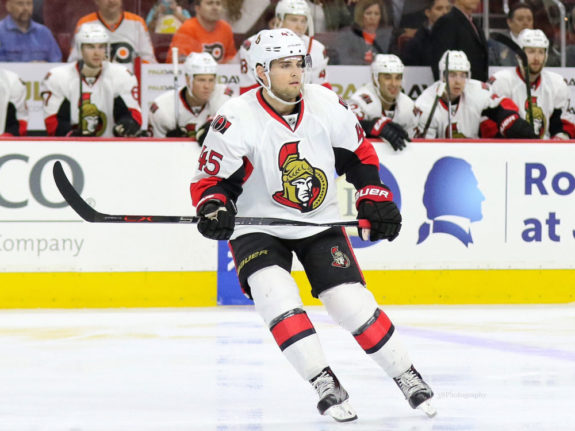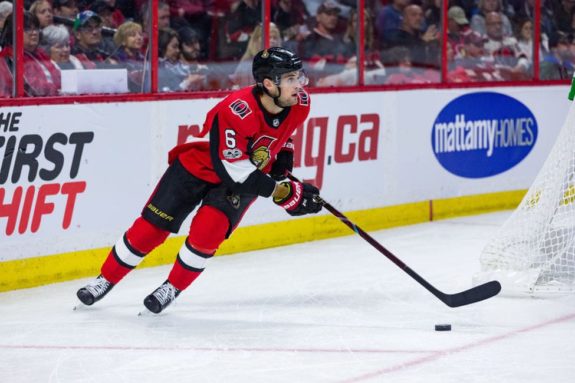The Montreal Canadiens will enter the 2021-22 season with some unanswered questions about the roster. With the influx of new faces, the coaching staff will have their hands full assessing and assembling the most effective lineup, including the defense pairings, with two new NHL-ready members joining the ranks.
One of the newest members on defense is Chris Wideman, who was previously a member of the Ottawa Senators and, briefly, the Edmonton Oilers and Florida Panthers before he left for the Kontinental Hockey League for the 2020-21 season. He was preemptively signed by the Canadiens on July 26 (a deal was in place before free agency opened) on a low-risk, one-year $750,000 deal, which could prove to be beneficial for both parties. As Andy Strickland reported, Wideman allegedly turned down a more lucrative $2 million offer to return to the KHL, an indication that he wants to succeed in the NHL.
On the other hand, Canadiens general manager Marc Bergevin was and still is in need of a mobile, puck-moving defenseman. Perhaps the veteran defender can help fill this role to some degree. There is little evidence to support the idea that Wideman can be a game-changer in the NHL. However, it is still reasonable to consider what we can expect from him in Montreal and where he will fit in to most effectively help the team. These are the questions I mean to address more broadly.
Wideman’s Lineup Placement
Wideman should be considered cheaper but stylistically similar to Erik Gustafsson, who helped the Canadiens in a very limited and specific role during their run to the Stanley Cup Final last season. Although this is a slight generalization, Wideman will likely rotate into the team’s bottom pairing much like Gustafsson. Barring long-term injuries or a trade of key players, he will probably find himself in and out of the lineup, switching with either Brett Kulak or Alexander Romanov.

(Amy Irvin / The Hockey Writers)
Wideman is a right-shot who plays the right side, which will affect his playing time. David Savard and Jeff Petry are already shoe-ins on the right side, but after them, the right side is open. Romanov has shown he can play either side. However, the left side would be ideal. Kulak has struggled in limited time on the right side as he is also a natural lefty. If Wideman can find a rhythm and contribute offensively early in the season, he may seize most of the playing time on the third pairing.
Offense and the Power Play
Wideman is primarily an offensive defenseman. His best professional season was with the Binghamton Senators in 2014-15, when he finished with 61 points (19 goals and 42 assists) in 75 games. Last season in the KHL, he finished with 41 points (9 goals and 32 assists) in 59 games, leading all defensemen in the category.

On the power play, Wideman should be a threat from the point as he has a heavy shot capable of beating goaltenders. Also, his speed will help push the pace on the breakout and should help with power-play zone entries if he is the designated puck carrier. If he can perform in this role, it will be difficult to take him out of the lineup as Petry is the only other defenseman in the lineup with considerable NHL power-play experience.
Question Marks on Defense
The main question mark concerning Wideman is his defensive ability. He is quick enough to skate his way out of trouble, but he might struggle in his own end against strong forechecking teams because of his size (listed at 5-foot-10). On the smaller NHL ice, he will be tested more frequently in physicality and puck battles. The Canadiens’ defense core is largely made up of big players who can clear the front of the net and middle of the ice. As a veteran player, we should expect Wideman to readjust to the NHL style, but we will have to wait and see if he fits into the team strategy. If he doesn’t, Kulak, Romanov, or others, will seize the opportunity.
With all of this in mind, Wideman is not the solution to the Canadiens’ lack of puck-moving defenseman, but he should provide some offense in a limited role, specifically on the power play. The coaching staff, led by Dominique Ducharme, will have to be selective in their usage of Wideman, because of his defensive failings. Some of these issues will be worked out in training camp as Wideman readjusts to the tempo and physicality of the NHL. But, overall, he still has the skill to make a difference, especially offensively. In a stacked Atlantic Division, full of high-scoring teams, Wideman’s presence should be welcomed.